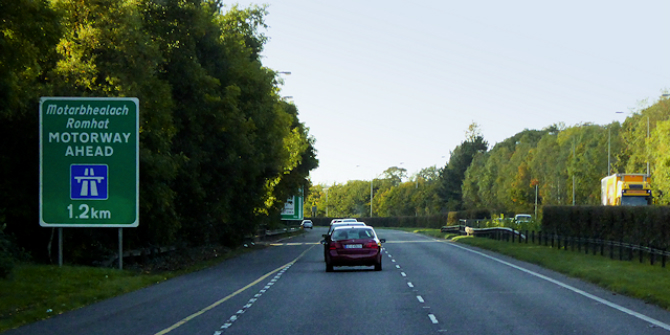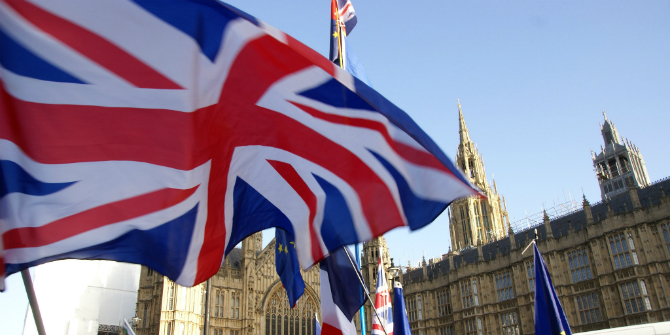 The Irish border has been centre stage of the Brexit negotiations for a while now. For some, it is viewed as an obstacle to realising the goals of ‘Global Britain’, for others it is a line of defence against a hard Brexit. As the debates transcend into increasing hyperbole, it is all too easy to forget why the 500km border across the island of Ireland is so pivotal in the UK’s withdrawal from the EU. Katy Hayward (Queen’s University Belfast) writes about what Brexit looks like for those living beside the Irish border.
The Irish border has been centre stage of the Brexit negotiations for a while now. For some, it is viewed as an obstacle to realising the goals of ‘Global Britain’, for others it is a line of defence against a hard Brexit. As the debates transcend into increasing hyperbole, it is all too easy to forget why the 500km border across the island of Ireland is so pivotal in the UK’s withdrawal from the EU. Katy Hayward (Queen’s University Belfast) writes about what Brexit looks like for those living beside the Irish border.
The Brexit at the Border study seeks to explain the significance of Brexit for the Irish border from the perspective of those living and working in the Central Border Region of Ireland/Northern Ireland. It is unique in terms of its focus (on the border region), its scope (covering both sides of the border) and its methods (gathering two types of qualitative data via an online survey and several focus groups in the area). Details of the project can be found in the full report.
The Brexit negotiators’ commitment to ‘avoiding a hard border’ has been interpreted as a quest to minimise the risk of paramilitary violence: don’t create targets for guns; don’t generate the need for security enforcement; don’t provoke a resurgence in irredentism. This Brexit at the Border study illuminates a different aspect of the same concern: the need to protect peace.
 Photo © David Dixon (cc-by-sa/2.0)
Photo © David Dixon (cc-by-sa/2.0)
It is very difficult to define what ‘peace’ means. Unlike violence, peace cannot be easily identified when it ‘happens’. Peace comes slowly; it involves ordinary choices and small decisions. It comes to feel normal and unremarkable. And the fact that it feels so ‘normal’ is both its strength and its susceptibility: we begin to take it for granted. The further away people are from the time and the place of the worst violence, the easier it is for them to forget the devastation, the costs and the consequences of it.
Peace seems normal now in the Central Border Region, but it does not seem invulnerable. As with our Bordering on Brexit report of November 2017, this study reveals that peace is at the forefront of people’s minds in the Central Border Region when it comes to Brexit. This is not to say that everybody agrees equally about what a ‘hard border’ would mean or about the potential for a return to violence. But the current openness of the border is widely regarded as a product of the peace process.
Appreciation of the benefits of a ‘seamless’ border is most certainly not confined to Remain voters, nor to people with Irish identities or Irish nationalist aspirations. Similarly, a desire – or demand, even – to maintain these benefits is shared across all communities. This research has revealed that it is not the case that there is a stark line of difference between British and Irish, Leave and Remain, north and south in the Central Border Region. Indeed, there is a striking level of commonality in the views and experiences across people living in this area, on both sides of the border.
Brexit is already affecting decisions being made here: being refused bank loans, moving business location to the other side of the border, holding off on employing more people, not taking a job across the border, not applying to university in the UK. Indeed, the most direct opportunities arising from Brexit run counter to cross-border cooperation, i.e. encouraging decisions to stay on one side of the border or go further abroad. This is of concern to a region in which economies of scale and cross-border connectivity have been so vital to enhancing the provision of services and widening the possibilities for development.
The complexity and realities of cross-border life in the Central Border Region exemplify the complexity and realities of the Brexit process. Disentangling the UK from the EU inevitably means drawing greater distinctions between the UK and its closest neighbour. This report explains how this process takes material, tangible form in the everyday experience of people in the Central Border Region. One young woman in a focus group, who has grown up in the post-1998 ‘Agreement generation’, expressed this point succinctly and poignantly: ‘Whenever they’re putting the border in place, just think of everyone going about their daily lives, trying to get across it’.
This article gives the views of the author, not the position of LSE Brexit or the London School of Economics. The full Brexit at the Border report can be found from Friday, June 15.
Katy Hayward is a Reader in Sociology at Queen’s University Belfast.






